Some countries need over 90 minutes more sleep than others, says new study
How many hours of sleep you need varies by culture, new research reveals
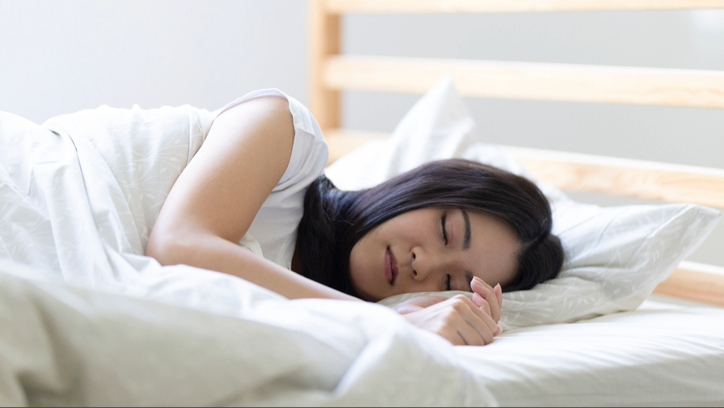
Here at Tom’s Guide our expert editors are committed to bringing you the best news, reviews and guides to help you stay informed and ahead of the curve!
You are now subscribed
Your newsletter sign-up was successful
Want to add more newsletters?

Daily (Mon-Sun)
Tom's Guide Daily
Sign up to get the latest updates on all of your favorite content! From cutting-edge tech news and the hottest streaming buzz to unbeatable deals on the best products and in-depth reviews, we’ve got you covered.

Weekly on Thursday
Tom's AI Guide
Be AI savvy with your weekly newsletter summing up all the biggest AI news you need to know. Plus, analysis from our AI editor and tips on how to use the latest AI tools!

Weekly on Friday
Tom's iGuide
Unlock the vast world of Apple news straight to your inbox. With coverage on everything from exciting product launches to essential software updates, this is your go-to source for the latest updates on all the best Apple content.

Weekly on Monday
Tom's Streaming Guide
Our weekly newsletter is expertly crafted to immerse you in the world of streaming. Stay updated on the latest releases and our top recommendations across your favorite streaming platforms.
Join the club
Get full access to premium articles, exclusive features and a growing list of member rewards.
How much sleep you need may depend on where you live, says new research published in May 2025.
While eight hours has long been perceived as the gold-standard sleep time, the new findings suggest there is no one-size-fits-all when it comes to the amount of sleep we need to perform well and feel good.
The study by researchers at the University of British Columbia assessed the sleep habits and health outcomes of 5,000 people from different continents including Europe, Asia, Africa, North America and South America.
While those residing in Japan got an average of six hours and (don't panic, sleep gurus, the survey showed their health is perfectly fine), the French are longer snoozers, clocking an average just short of eight hours a night.
What's interesting about the findings is that, despite some countries sleeping significantly less than eight hours, which has long been taken as the gold-standard sleep time, there was no evidence of them being less healthy.
This highlights just how important it is for professionals to take cultural context into account when penning national sleep advice. Let's take a closer look...
Key takeaways from the study
- Americans need just over seven hours of sleep
- Shorter sleep duration did not equal bad health
- People tend to sleep one hour less than they need
The researchers gathered and analysed sleep data and health outcomes from nearly 5,000 people across 20 countries worldwide. A sample of 250 people from each country were surveyed about their sleep duration, current health and memory performance.
Get instant access to breaking news, the hottest reviews, great deals and helpful tips.
The findings published in Proceedings of the National Academy of Sciences (PNAS) revealed that the hours of sleep required for good health varies significantly across different cultures.
"Despite the common advice to get eight hours of sleep, our findings suggest that sleep recommendations need to be adjusted based on cultural norms," says Dr. Steven Heine, professor of social and cultural psychology at the University of British Columbia and senior author of the study.

While you may assume people from countries with short sleep durations have worse health outcomes, the study found no correlation between less sleep and negative health in shorter-sleeping nations.
Instead, "People who slept closer to their own culture's norms for sleep duration tended to have better overall health," explains Dr. Christine Ou, assistant professor in the school of nursing at University of Victoria and the study's lead author.
Moreover, the researchers also discovered that in all 20 countries involved in the study, people appeared to be sleeping at least one hour less than what was considered optimal for their culture, which rings alarm bells.
How much sleep you need, depending on where you live
The average sleep time and sleep needs for optimal health differs from country to country.
For example, the average in Japan was six hours and 18 minutes, while in France it was seven hours and 52 minutes. Canada sits in between where people sleep an average of seven hours and 27 minutes.
Brits sleep longer than Americans, with average sleep times of just over seven and a half hours and just over seven hours respectively.
Here's a breakdown of the average sleep duration in each of the 20 countries surveyed:
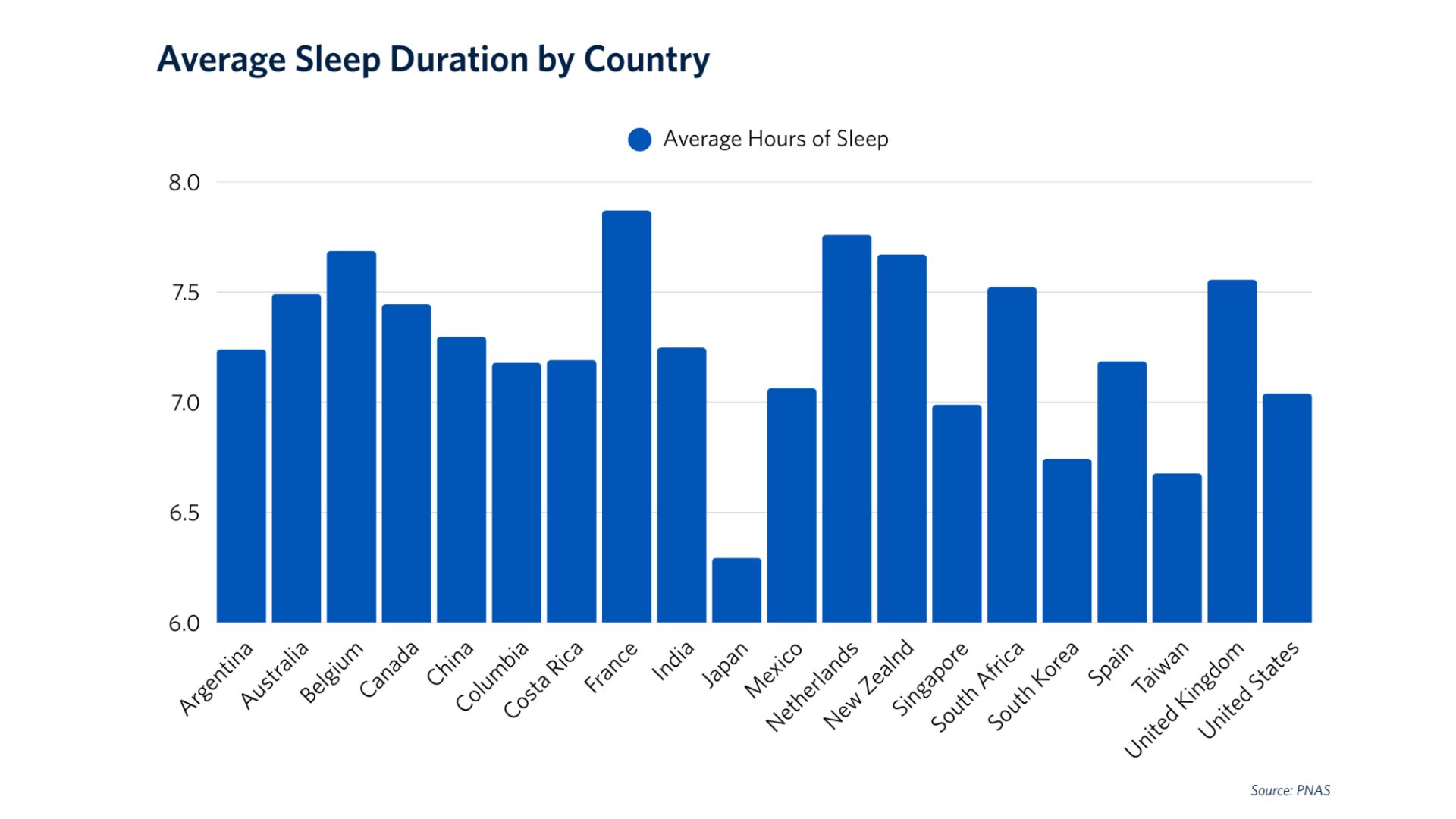
Other factors that influence how much sleep you need
Where you live is not the only influence on how many ZZZs you should clock for optimal health. Your age, genetics and lifestyle each play a part too. Here's why...
How old you are
Our age determines how much sleep we need and your sleep needs will change as you move through life stages.
To support development, babies and toddlers need between 11 and 16 hours of sleep per 24-hour day. This is often broken into naps and overnight sleep. Unfortunately, there's not the same excuse for afternoon napping in adulthood.
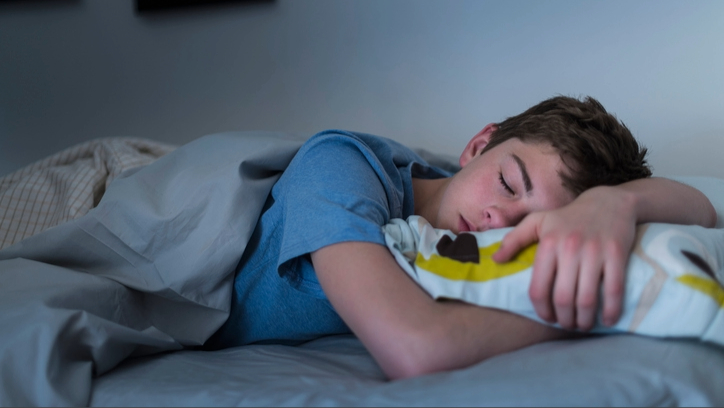
Children aged three to five generally need 10 to 13 hours, and six to 12-year-olds need between nine and 12 hours.
Teenagers need eight to 10 hours. Adults need seven to nine, and by the time you hit 60, this reduces to seven to eight hours.
Your genetics
Our genetics also have a part to play in our sleep patterns and determine whether we are snoozers, night owls or morning larks.
Research published in 2019 identified a specific gene that only people who need less than six and a half hours of sleep a night to feel well rested had. Family members who inherited one copy of this gene had a shortened sleep cycle.
How much you exercise
Generally, people with active lifestyles need more sleep than those who spend most their time sedentary to make sure their muscles repair between intense physical exertions.
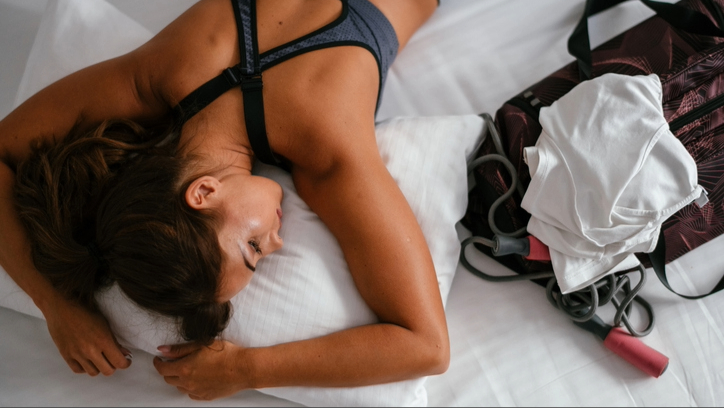
Athletes tend to need more sleep to make sure they recover between intense workouts and adapt to training. Hence, a lot of time in sports training blocks are spent sleeping.
3 ways to improve sleep quality
But it's not all about quantity. Despite the new study's focus on sleep duration, long standing research shows sleep quality is more important than quantity.
What do we mean by sleep quality? Good quality sleep is when you move through continuous sleep cycles undisturbed, spending ample time in each essential sleep stage so you wake up restored with energy.
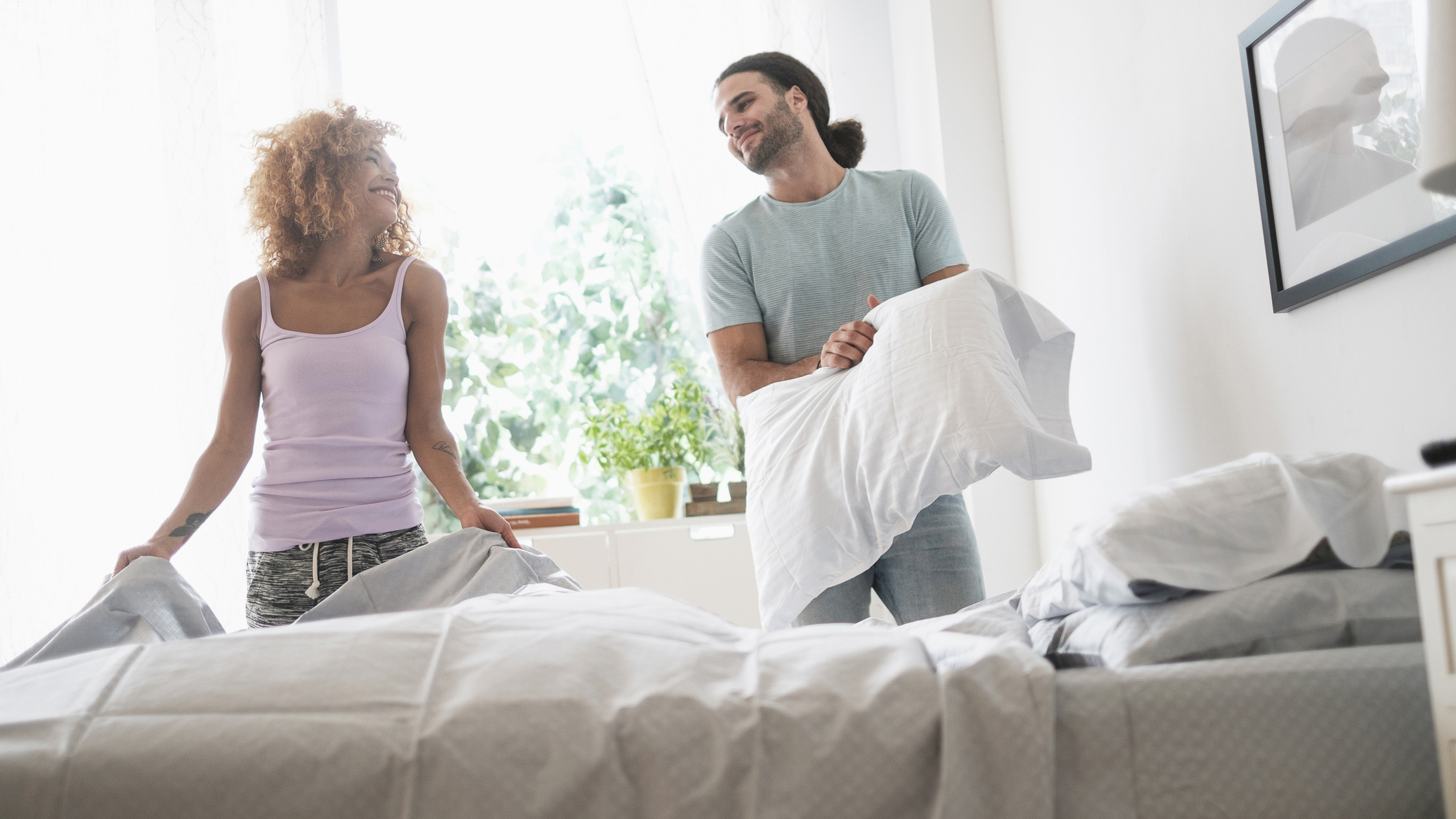
So, instead of stressing about the time you spend snoozing, implement these tips to improve the quality of your rest.
1. Invest in your sleep space
Investing in your sleep space is key to bagging comfortable, undisturbed sleep. A reliable mattress is the main factor here.
Choosing the best mattress for you means finding a bed that supports your sleep style and body type and accommodates your specific sleep needs. For example, you may need a mattress with targeted back pain relief or one designed to support side sleeping.
Next you'll want to kit your bed out with comfy bedding including the best pillow for your sleep position and a comforter that will keep you cosy but cool.
2. Sleep in a cool bedroom
There is a close link between temperature and your circadian rhythm (aka your internal body clock). Your body temperature naturally drops as you prepare to sleep, signalling your brain to release the sleep-inducing hormone melatonin.
Therefore, keeping your bedroom cool, and sleeping on a top-rated cooling mattress if you get particularly hot when you sleep, helps you fall asleep fast and sleep well through the night.
3. Improve your sleep hygiene
Improving your sleep hygiene involves a combination of literal hygiene measures like maintaining a clean, dust-free sleep space as well as lifestyle choices like limited screentime before bed and managing your caffeine intake during the day.
Keeping your bedroom clean ensures you're not disturbed by skin irritations or bouts of coughing and sneezing caused by dust and allergies hiding in your sheets.
Experts also recommend keeping blue-light screens out of bed for better quality sleep and cutting off stimulants like caffeine in the early afternoon so the alertness-enhancing effect wears off by bedtime.

Eve is a sleep tech product tester and writer at Tom's Guide, covering everything from smart beds and sleep trackers, to sleep earbuds and sunrise alarm clocks. Eve is a PPA-accredited journalist with an MA in Magazine Journalism, and has four years’ experience writing features and news. In her role as Sleep Tech Product Tester and Writer for Tom's Guide, Eve is constantly trying out and reviewing the latest sleep products from brands such as Apple, Garmin, Whoop, Hatch, Sleep Number, Eight Sleep, and Oura. A fitness enthusiast who completed the London Marathon earlier this year, Eve loves exploring the relationship between good sleep, overall health, and physical performance, and how great sleep tech can make that relationship even better.
You must confirm your public display name before commenting
Please logout and then login again, you will then be prompted to enter your display name.
 Club Benefits
Club Benefits










